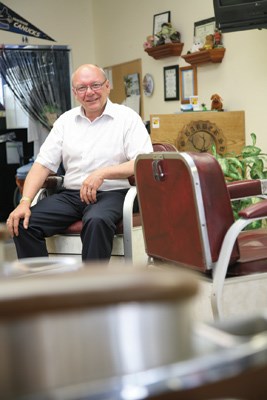New Westminster businesses aren't eager for more paperwork and red tape when the returning provincial sales tax and goods and services tax replace the outgoing harmonized sales tax on April 1.
Even though the harmonized sales tax impacted his bottom line, Elks Barbershop owner Guy Quesnel wanted the province to keep the single-tax HST.
"It didn't bother me, the HST. I thought it was OK," he said.
Before July 1, 2010, certain services, like hair salon and barbershops, only had the five per cent GST added to the bill, but the HST combined both the federal tax and the provincial sales tax.
Quesnel didn't change his after-tax prices when the HST came into effect, which meant he ate the additional tax.
Quesnel voted in favour of keeping the HST because it made sense to have one tax, he said.
The province held a referendum on whether to keep or scratch the HST in 2011. The majority of residents voted to abolish the HST.
Michael Kaisaris from Re-Up BBQ at the River Market also opposed returning to the two-tax formula.
"It'll mean more paperwork," he said. "I'm not a great fan of the old system. I like the HST. It makes a very simplified accounting in the way that we deal with the government, and I'm not looking forward to having it less simplified, personally, I guess I don't have a lot of choice in the matter, unfortunately."
Kaisaris' business was barely in place before the HST was implemented in July 2010, so he can't say how the shift will impact his bottom line.
"I'm certainly not looking forward to the extra paperwork," he said, laughing.
A number of restaurants lobbied against the HST, saying the tax would deter business.
But for Kaisaris, other cost pressures are proving more challenging than the tax change.
"Meat prices are going to be skyrocketing this year because of the drought in the American Midwest. Even though most of the pork and beef in the province isn't a part of the North American market, our suppliers are going to be matching North American market prices for the most part," he said. "I don't think people should expect prices to go down anywhere on food at any time because of the way climate change is affecting the way we grow crops. Food prices are just going to be going up, and up and up and up and up all the time."
It's something Kaisaris is familiar with since they opened more than two years ago.
"When we first opened our business, the second summer was a big fire summer in Australia, and so even the global pork market put increased pressure on B.C. pork producers to raise their prices because they could be shipping them overseas," Kaisaris said. "It's definitely the same with lamb, and it's probably going to be the same with beef this year, just because there was so much loss in the corn crops last summer."
Despite these challenges, Kaisaris said business has been steady and got a recent boost when the Vancouver Sun mentioned the River Market eatery in a couple of articles.
Shelagh Anderson, who owns Lofty Living on Columbia Street, said she finds the flip-flopping of the tax formulas to be the most bothersome aspect, rather than the HST itself.
"The only part that matters to me about it . is the fact that they keep going back and forth," Anderson said. "Every time they do, it's a big rigmarole, it's cause for a lot more paperwork. You have to re-register. It's just upheaval, and it costs us."
The HST made it easier for bookkeeping, but after a few years in business, Anderson said she knows how to adapt.
"You just have to roll with these things," she said. "It is a pain to get re-set up. I have to create new Excel sheets, but you just have to do it."
Local business people who want a little help with the transition can attend the New Westminster Chamber of Commerce PST transition seminar on Friday, March 1, from 10 a.m. to noon at Sprott Shaw College, 420-88 Sixth St.
The seminar is free. To reserve a seat, contact 604-521-7781 or email Miranda@newwestcham ber.com.
editorial@ royalcityrecord.com



